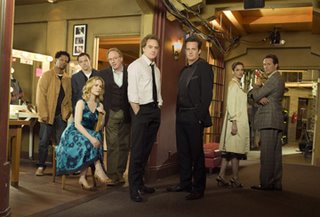
"Okay, tell the writers' room they're gonna have to stretch it another twenty-five seconds and I'm sure that making it longer was the missing ingredient in making it funny." -- Cal Shanley, Studio 60
Studio 60 pushes this idea by using the behind-the-scenes stage to be more topical. It's a stage for the Christian Harriet Hayes to face off against former lover and diametrically opposed Liberal satirist, Matt Albie, for ultra-capitalist by-the-numbers CEO Jack Rudolph to lord over idealistic network president Jordan McDeere as she champions higher quality television. You could call it, as Matt Albie does, the cast of a Fellini film. You can, of course, if you were just as pretentious and you know who Fellini, Paddy Chayevski, and the Hollywood Ten are. Which is precisely what I like about it. In a non-condescending way (despite John Goodman's Judge Rober Bebe's statement), it expects a lot out of its viewers, and it doesn't dumb it down. I always wonder why people don't find dumbing down a drama in order to reach more viewers to be more condescending, but I suppose that's just me. Though it is difficult hearing Amanda Peet's exposition for TV jargon TV producers should already know.
As I've been working in live TV for these last six months, I have to say that's likely one of the reasons I love this show. It's still a fantastic reality put into the behind the scenes world of TV - not unlike what Network did years ago. Like live TV, commentators only read off teleprompters and become self-conscious about their makeup, the control room is full of people reading magazines and watching baseball games rather than pay attention to what's going on on stage, actors squabble, writers slack off, and good producers take the ridiculousness reality hands them (mostly) in stride (Simon: Tom's been arrested because he assaulted some gay guys who were assaulting Harriet, but the computer coughed up an old warrant so he's on his way to Parump, Nevada, but he's wearing my jacket and when they search him they're going to find my joint in his pocket. Danny: Seriously, is this a sketch? Simon: No it's not, where've you been? Danny: BREAKFAST!).
Every actor in this series is giving their finest performance of their careers. It isn't the cast of "The West Wing", but it's close. One of the show's toughest challenges is the success of Aaron Sorkin's last show. A show that, in fact, he didn't really want to do - it was a last minute pitch suggested by his friend Brad Whitford when he met with a few TV execs. Studio 60 is far more personal. Producer Danny Tripp, like Aaron Sorkin, had a recent public relapse of sobriety. Matt Albie, like Aaron Sorkin, has a former relationship with a right-wing Christian entertainer, like Kristen Chenoweth. Like Aaron Sorkin and partner Thomas Schlamme, Matt and Danny fight network execs for what they see as better quality television. And maybe, just maybe, that's the problem.
I spoke to a friend recently who loved this show initially, but's now worried that it's getting too smart for its own good. The two built in audiences for this project - West Wing fans and, by extention, SNL fans - would likely not be too receptive to this show. Saturday Night Live, while being the classic comedy show that it is, was never the stage for reflections on the Christian Right's hold on mainstream media, or other topical issues like gay marriage, and the threat of terrorism. Further, the SNL-like show that Studio 60 don't have the stakes as high as they were in "The West Wing". What could a somewhat popular late night variety show do that even compares to this nation's president? Then again, that is exactly the question Studio 60 poses. To paraphrase Paddy Chayevsky - it's the most powerful propaganda force on Earth.
While the media is supposedly run by liberals, but as Steven Weber's brilliant Jack Rudolph says, "The media isn't run by liberals, it's run by money, stockholders that hold me accountable." The show began with Judd Hirsch's powerful monologue pleading for higher-quality television. While many reviewers interpreted this as a by-gone thought, they forgot the second half of that monologue - higher quality television inspite of commerce. The Christian Right's hold on networks and advertisers? Money. Dollars and cents. The Bottom Line. This is a show about the business of entertainment, and everything else that plays into it. When a star has an opinion on gay marriage, it takes dollars away. With the mix of personalities that is the "Cast of a Fellini Film" that Matt Albie endearingly refers to it as, it becomes this battleground of Red vs. Blue, Art vs. Commerce, small-town vs. large-town, atheist vs. believer, and lover vs. ex-lover.
Funny though, the reason NBC picked up the full season with declining ratings was built right into the show - Studio 60 has the highest viewing audience of households with an income of $75,000 or more. High art apparently means high class, which means high class buyers, which means high class money. "Heroes" was probably not the best lead in show for "Studio 60".
No comments:
Post a Comment